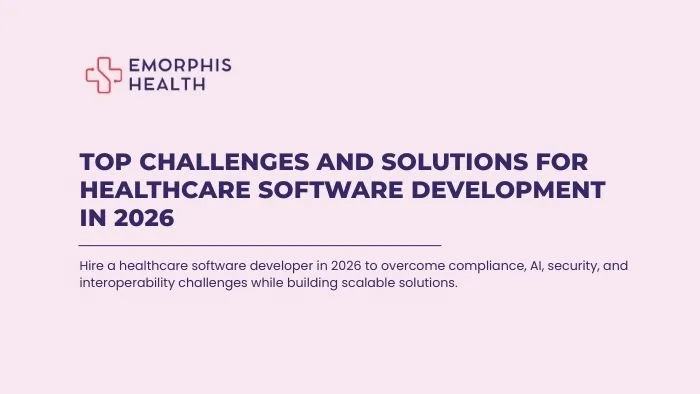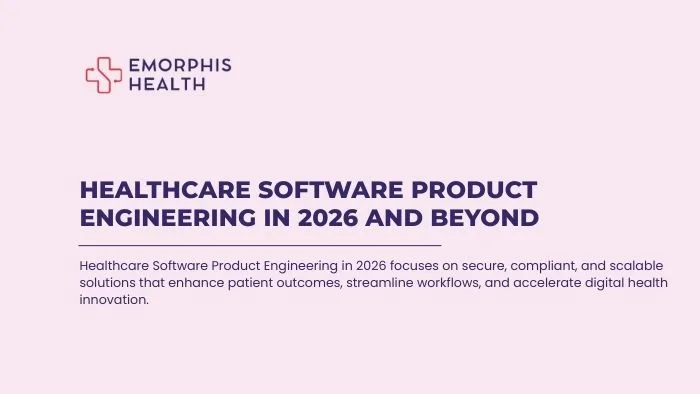Overview
See Contents
Digital health refers to the use of technology, such as mobile devices, electronic health records, wearable devices, and telemedicine, to improve healthcare delivery, patient outcomes, and overall healthcare system efficiency. Digital health technologies enable healthcare providers with digital healthcare solutions to capture and analyze patient data in real-time, allowing for more personalized and effective treatment plans.
Examples of digital health technologies include telemedicine, which allows healthcare providers to communicate with patients remotely, mobile health apps that help patients manage their health conditions and medication schedules, and wearable devices such as fitness trackers that monitor physical activity and vital signs.
Digital health has the potential to transform healthcare delivery and improve health outcomes by increasing access to care, improving patient engagement and satisfaction, reducing healthcare costs, and enabling more personalized and effective treatments. However, there are also concerns about data privacy and security, as well as the need for effective regulation and standardization of digital health technologies.
Top digital health companies
There are numerous companies operating in the digital health industry, ranging from startups to established players. Here are some of the top digital health companies, based on their market capitalization, revenue, user base, and industry recognition:
Teladoc Health
Teladoc Health is a leading telemedicine provider, offering virtual consultations with doctors and other healthcare providers. The company also provides digital health solutions for chronic care management and mental health support.
Amwell
Amwell is another telemedicine provider that offers virtual consultations with healthcare providers, as well as remote patient monitoring solutions for chronic care management. The company also partners with health systems and payers to offer digital health solutions to their patients and members.
Cerner Corporation, now Oracle Health
Cerner Corporation is a leading provider of electronic health records (EHRs) and clinical information systems. The company also offers population health management solutions, revenue cycle management tools, and other digital health solutions for healthcare providers.
Epic Systems Corporation
Epic Systems Corporation is another major provider of EHRs and clinical information systems, serving healthcare providers in the US and internationally. The company also offers patient engagement solutions, telehealth tools, and other digital health products.
Fitbit
Fitbit is a popular wearable device company that offers fitness trackers and smartwatches with health-monitoring capabilities. The company also offers a health and wellness platform that allows users to track their health metrics, set goals, and connect with healthcare providers and other users.
Apple
Apple is a technology giant that has been expanding its presence in the digital health industry. The company’s products, such as the Apple Watch and iPhone, offer health monitoring capabilities, and its Health app allows users to track their health data and share it with healthcare providers.
Livongo
Livongo is a digital health company that offers chronic care management solutions for diabetes, hypertension, and other conditions. The company uses data analytics and personalized coaching to help patients manage their conditions and improve their health outcomes.
Roche
Roche is a pharmaceutical and diagnostics company that has been investing in digital health solutions, such as remote patient monitoring devices and digital therapeutics. The company’s digital health portfolio includes solutions for cancer care, neurology, and other areas of healthcare.
Philips
Philips is a global healthcare technology company that offers a wide range of digital health solutions, including telehealth, remote patient monitoring, imaging systems, and EHRs. The company’s digital health products are used in hospitals, clinics, and home healthcare settings.
Proteus Digital Health
Proteus Digital Health is a digital health company that has developed a unique platform for medication adherence and remote patient monitoring. The company’s system includes a sensor-enabled pill and a wearable device that tracks medication use and health metrics.
What are digital healthcare solutions?
Digital healthcare solutions refer to the use of technology to improve healthcare delivery, patient outcomes, and overall healthcare system efficiency. These solutions can range from telemedicine platforms to electronic health records (EHRs) to wearable devices and mobile health apps. Lets us check some examples.
1. Telemedicine platforms
Telemedicine platforms allow healthcare providers to communicate with patients remotely via videoconferencing, phone calls, or text messaging. This can help to increase access to care for patients in rural or underserved areas, as well as improve the convenience of healthcare delivery for patients.
Check more detail on Telemedicine App Development Solutions
2. Electronic health records (EHRs)
EHRs are digital versions of patients’ medical records, which can be accessed and updated by healthcare providers in real-time. EHRs can help to improve patient safety, reduce medical errors, and increase the efficiency of healthcare delivery.
3. Wearable devices
Wearable devices, such as fitness trackers, smartwatches, and biosensors, can monitor patients’ health metrics in real-time and alert healthcare providers to potential health issues. The wearable devices can also help patients to manage chronic conditions, such as diabetes or hypertension, by tracking their symptoms and providing feedback on their treatment plans.
4. Mobile health apps
Mobile health apps can help patients to manage their health conditions, track their medication schedules, and monitor their health metrics. Health apps can also provide patients with educational resources and connect them with healthcare providers for virtual consultations.
5. Remote patient monitoring
Remote patient monitoring solutions allow healthcare providers to track patients’ health metrics, such as blood pressure, blood glucose levels, and oxygen saturation, from a distance. This can help to improve patient outcomes and reduce healthcare costs by enabling earlier interventions for potential health issues.
Digital healthcare solutions have the potential to transform healthcare delivery and improve patient outcomes by increasing access to care, improving patient engagement and satisfaction, reducing healthcare costs, and enabling more personalized and effective treatments. However, there are also concerns about data privacy and security, as well as the need for effective regulation and standardization of digital health technologies.
What is Digital Twin Healthcare?
A digital twin in healthcare is a virtual model of a patient, used to simulate and analyze healthcare outcomes in a personalized and data-driven manner. The concept of digital twin technology has its origin in the manufacturing industry, where it is to create virtual replicas of physical objects such as machines or products. In healthcare, digital twin technology is being to improve patient care and outcomes by providing healthcare providers with a deeper understanding of their patient’s health status and potential treatment options.
Digital twin technology in healthcare involves the use of data from various sources, such as electronic health records (EHRs), wearables, and other connected devices, to create a virtual model of the patient. This virtual model can provide simulation for different treatment options and predict their potential outcomes, based on the patient’s unique health profile and medical history.
An Example
For example, a digital twin of a patient with diabetes can simulate the effects of different medication regimens, lifestyle changes, and other interventions on the patient’s blood sugar levels, based on data from the patient’s EHR, glucose monitoring device, and other sources. This could help healthcare providers to identify the most effective treatment plan for the patient, based on their individual needs and circumstances.
Digital twin technology improves patient engagement and education, by providing patients with a virtual representation of their health status and treatment options. Patients can use the digital twin to visualize the effects of different lifestyle changes and treatment options on their health outcomes and make more informed decisions about their care.
Overall, digital twin technology has the potential to revolutionize healthcare by enabling more personalized and effective treatments, reducing healthcare costs, and improving patient outcomes and satisfaction. However, there are also challenges to overcome, such as data privacy and security concerns, interoperability issues, and the need for effective regulation and standardization of digital twin technology in healthcare.
What Are The Various Digital Health Innovations?
Digital health innovation refers to the development of new or improved digital technologies, solutions, and processes that transform healthcare delivery and improve patient outcomes. Digital health innovation has the potential to revolutionize healthcare by enabling more personalized, data-driven, and patient-centric care, as well as reducing healthcare costs and improving healthcare system efficiency. Here are some examples of digital health innovations:
- Artificial intelligence (AI) and machine learning (ML): AI and machine learning help to analyze healthcare data, predict disease outcomes, and identify personalized treatment options for patients. AI-powered chatbots and virtual assistants provide patients with personalized health advice and support.
- Internet of Things (IoT) devices: IoT devices, such as wearables and biosensors, helps monitor patients’ health metrics in real-time and provide healthcare providers with valuable data to inform treatment decisions.
- Telemedicine platforms: Telemedicine platforms help connect patients with healthcare providers remotely, enabling more convenient and accessible healthcare delivery, particularly for patients in rural or underserved areas.
- Blockchain technology: Blockchain technology provides a way to improve the security and privacy of healthcare data, as well as enable more efficient and accurate data sharing between healthcare providers.
- Digital therapeutics: Digital therapeutics are software-based interventions that are to treat or manage medical conditions. These interventions act as stand-alone treatments or in combination with traditional therapies.
Digital health innovation has the potential to transform healthcare by enabling more personalized, efficient, and effective care. However, there are also challenges to overcome, such as data privacy and security concerns, interoperability issues, and the need for effective regulation and standardization of digital health technologies. Successful digital health innovation requires collaboration between healthcare providers, technology companies, patients, and other stakeholders, as well as a commitment to patient-centric and evidence-based healthcare delivery.
Hiring a Digital Health consultant
A digital health consultant is a professional who provides expert advice and guidance to healthcare organizations, technology companies, and other stakeholders in the digital health industry. A digital health consultant may have a background in healthcare, technology, or both, and typically possesses knowledge and expertise in areas such as healthcare regulations, technology trends, patient engagement strategies, and data analytics.
The responsibilities of a digital health consultant include:
- Assessing the needs and goals of healthcare organizations and developing strategies to implement digital health solutions that improve patient outcomes and reduce costs.
- Providing guidance on regulatory compliance, data privacy, and security issues related to digital health solutions.
- Analyzing healthcare data to identify patterns and trends that can inform healthcare decision-making and improve patient outcomes.
- Identifying emerging trends and technologies in the digital health industry and advising clients on how to incorporate them into their business models.
- Educating healthcare providers, patients, and other stakeholders about digital health solutions and their benefits.
- Managing digital health projects, including vendor selection, implementation, and ongoing maintenance.
- Providing training and support to healthcare staff on how to use digital health tools and technologies.
Digital health consultants may work for consulting firms, healthcare organizations, technology companies, or as independent contractors. They typically possess strong analytical, communication, and project management skills, as well as a deep understanding of the healthcare industry and emerging digital health technologies.
How Much Do Digital Healthcare Solutions Cost?
The cost of digital healthcare solutions can vary widely depending on the type of solution, the complexity of the technology involved, and the size and scope of the implementation. Some digital healthcare solutions, such as mobile health apps or remote patient monitoring devices, may be relatively low-cost and accessible to individual patients or healthcare providers.
Other solutions, such as enterprise-level electronic health record (EHR) systems or population health management platforms, may require significant investments in infrastructure, software, and personnel.
The cost of digital healthcare solutions may also depend on the region or country in which they are being implemented. In some countries, such as the United States, the cost of healthcare delivery is generally higher than in other countries, which can also impact the cost of digital healthcare solutions.
However, it is important to note that while some digital healthcare solutions may require a significant upfront investment, they can also provide significant long-term cost savings by enabling more efficient and effective healthcare delivery. For example, remote patient monitoring devices can help to reduce hospital readmissions and prevent complications, leading to cost savings for healthcare providers and insurers.
Overall, the cost of digital healthcare solutions is an important consideration for healthcare providers and organizations when evaluating and implementing new technologies. It is important to carefully assess the costs and benefits of digital healthcare solutions and to ensure that they are aligned with the organization’s strategic goals and objectives.
Conclusion
In conclusion, digital health innovation and solutions are transforming the way healthcare is delivered, with the potential to improve patient outcomes, reduce healthcare costs, and increase access to care. From AI and machine learning to telemedicine and digital therapeutics, the range of digital healthcare solutions available is vast and constantly expanding.
However, successful implementation of these solutions requires collaboration between healthcare providers, healthcare software product engineering technology companies, patients, and other stakeholders, as well as a commitment to patient-centric and evidence-based healthcare delivery.
While cost is an important consideration in evaluating digital healthcare solutions, the potential long-term benefits can make the investment worthwhile.
As technology continues to advance, the opportunities for digital health innovation and solutions are immense and will continue to shape the future of healthcare delivery.








